CFTC Alert! CFTC Releases Enforcement Advisory on Penalties, Monitors and Admissions: "In negotiations, respondents should no longer assume that no-admit, no-deny resolutions are the default."
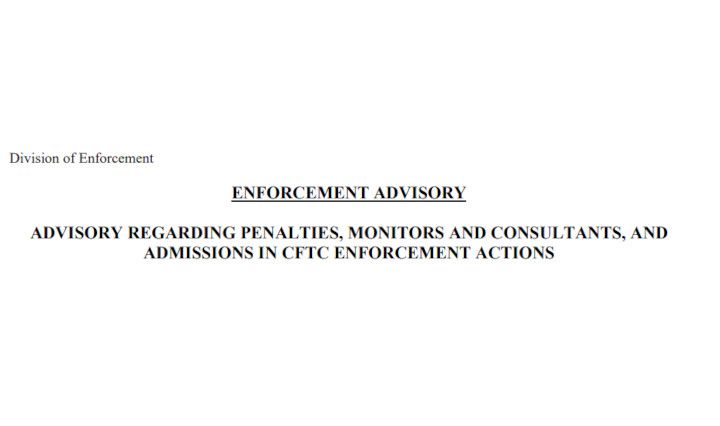
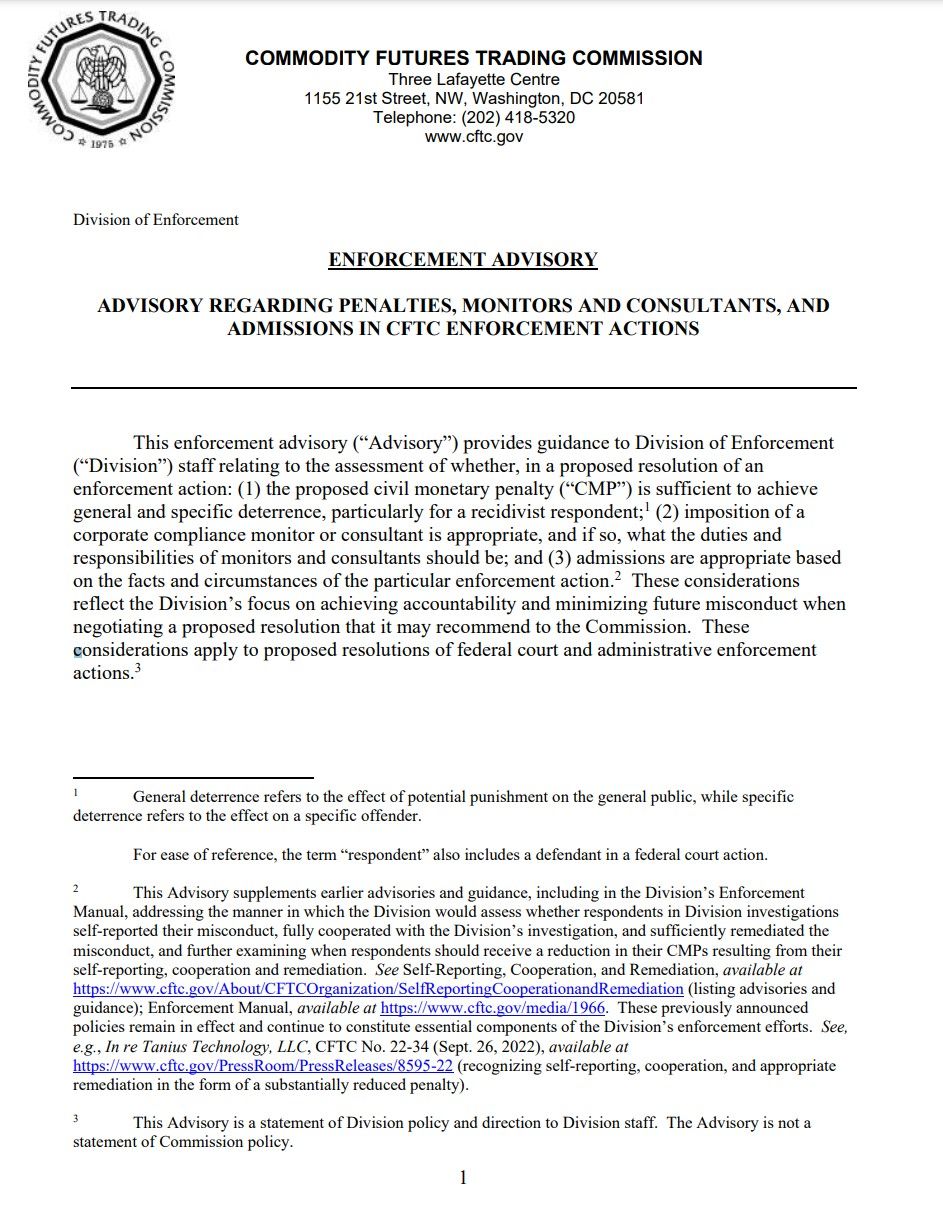
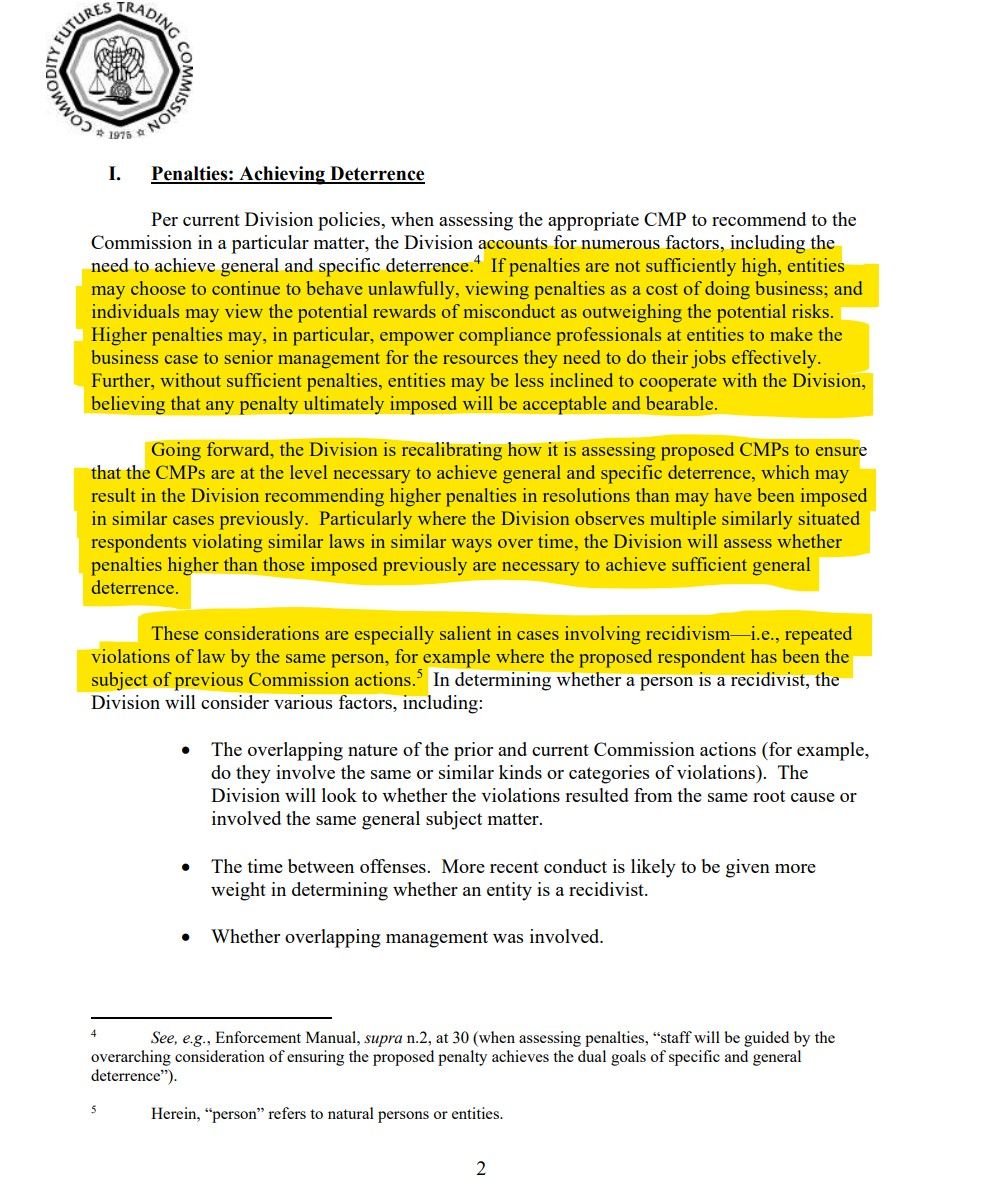
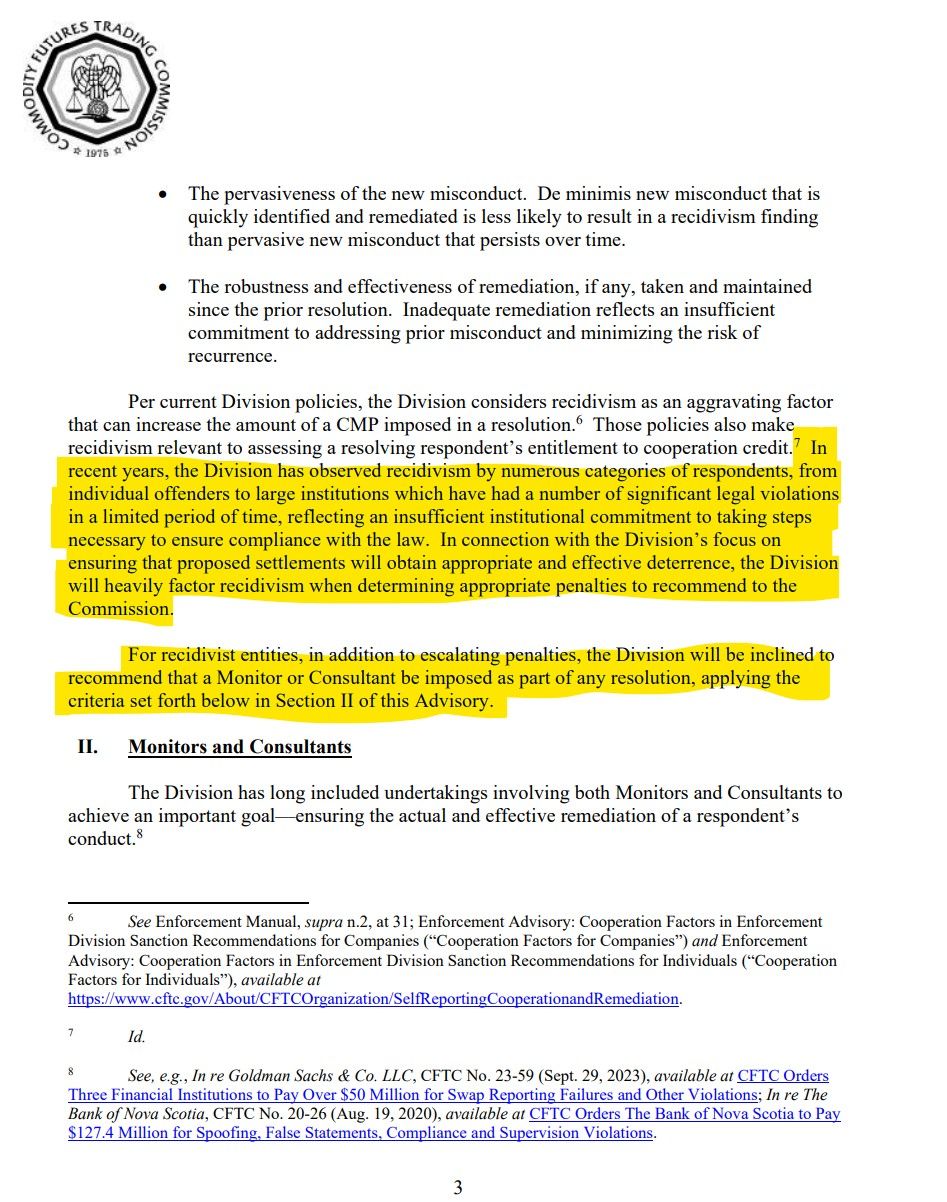
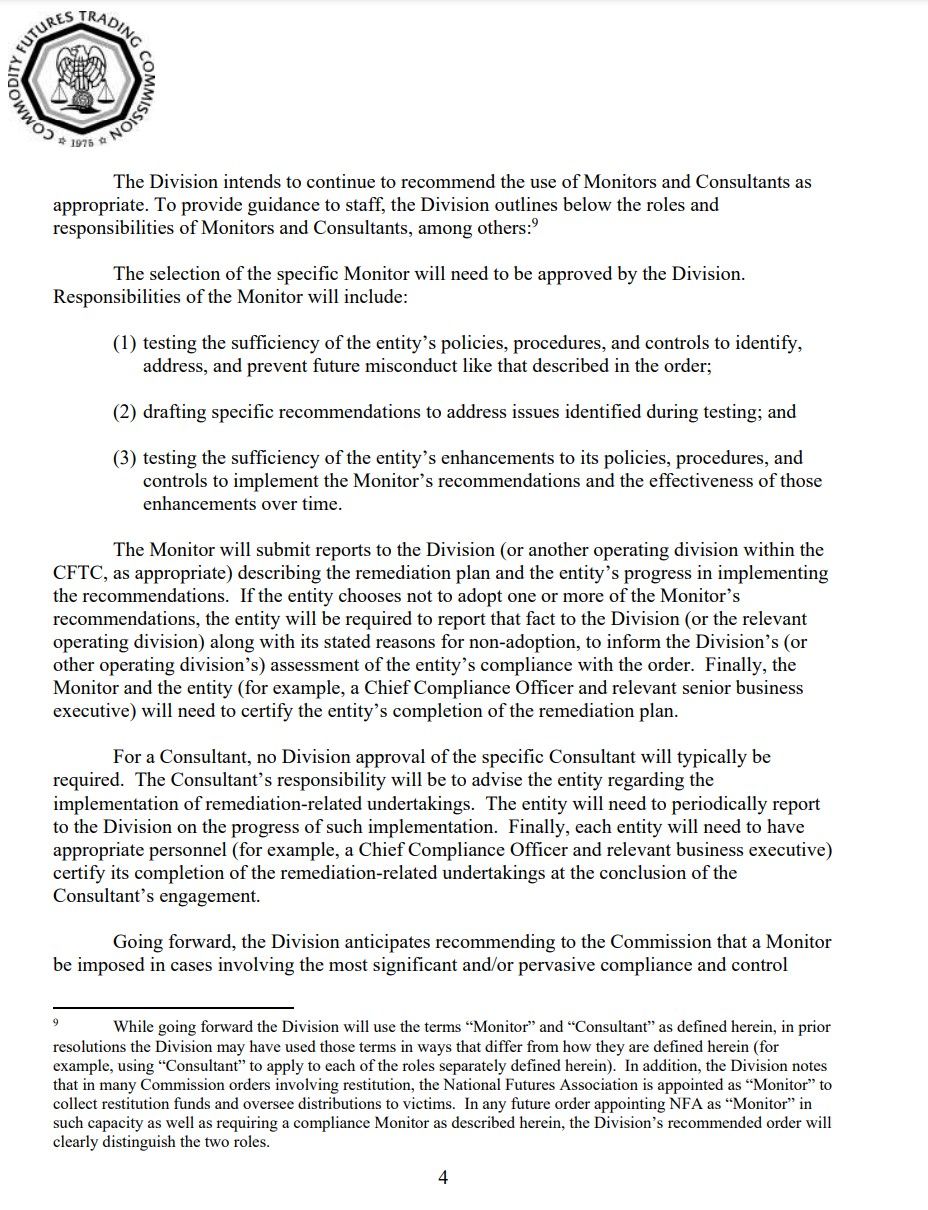
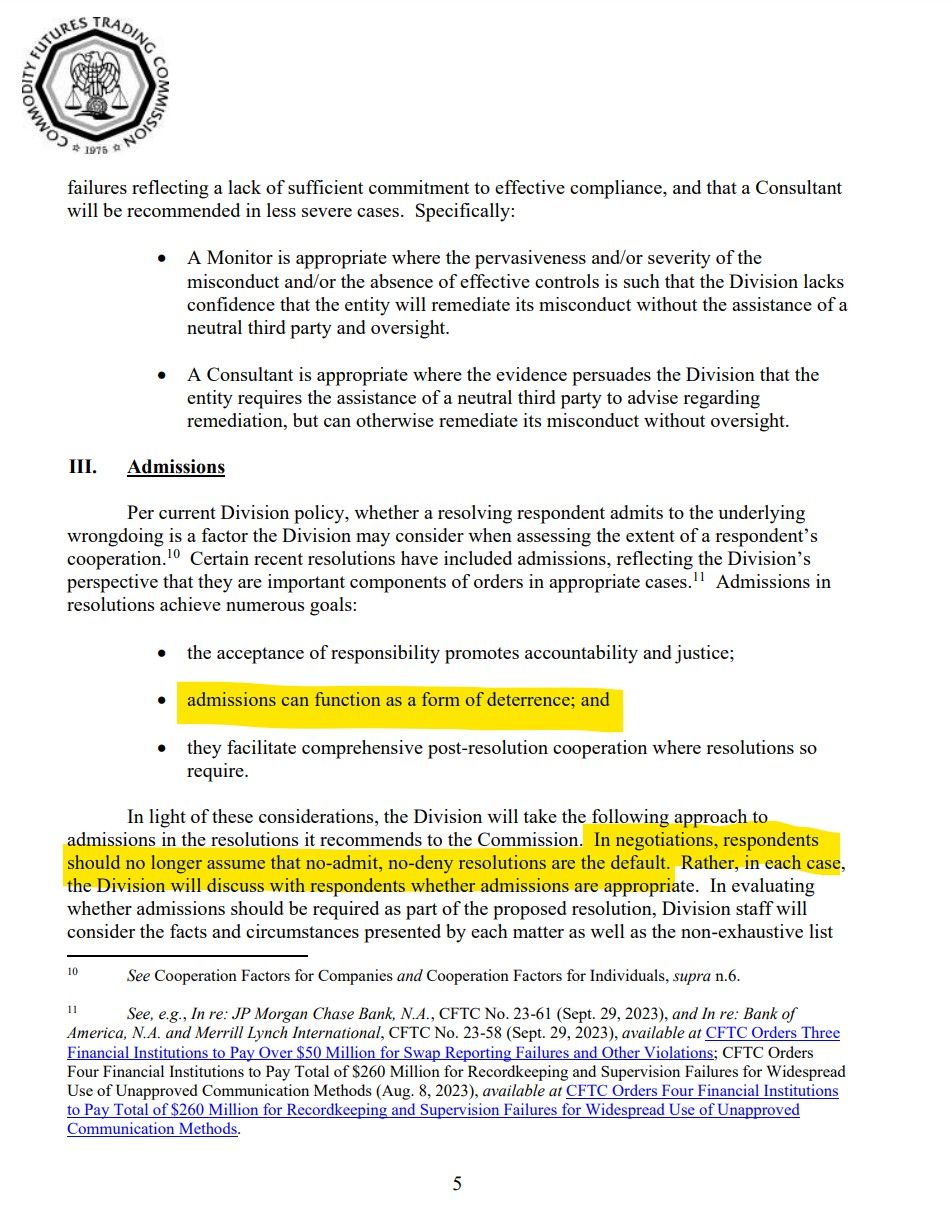

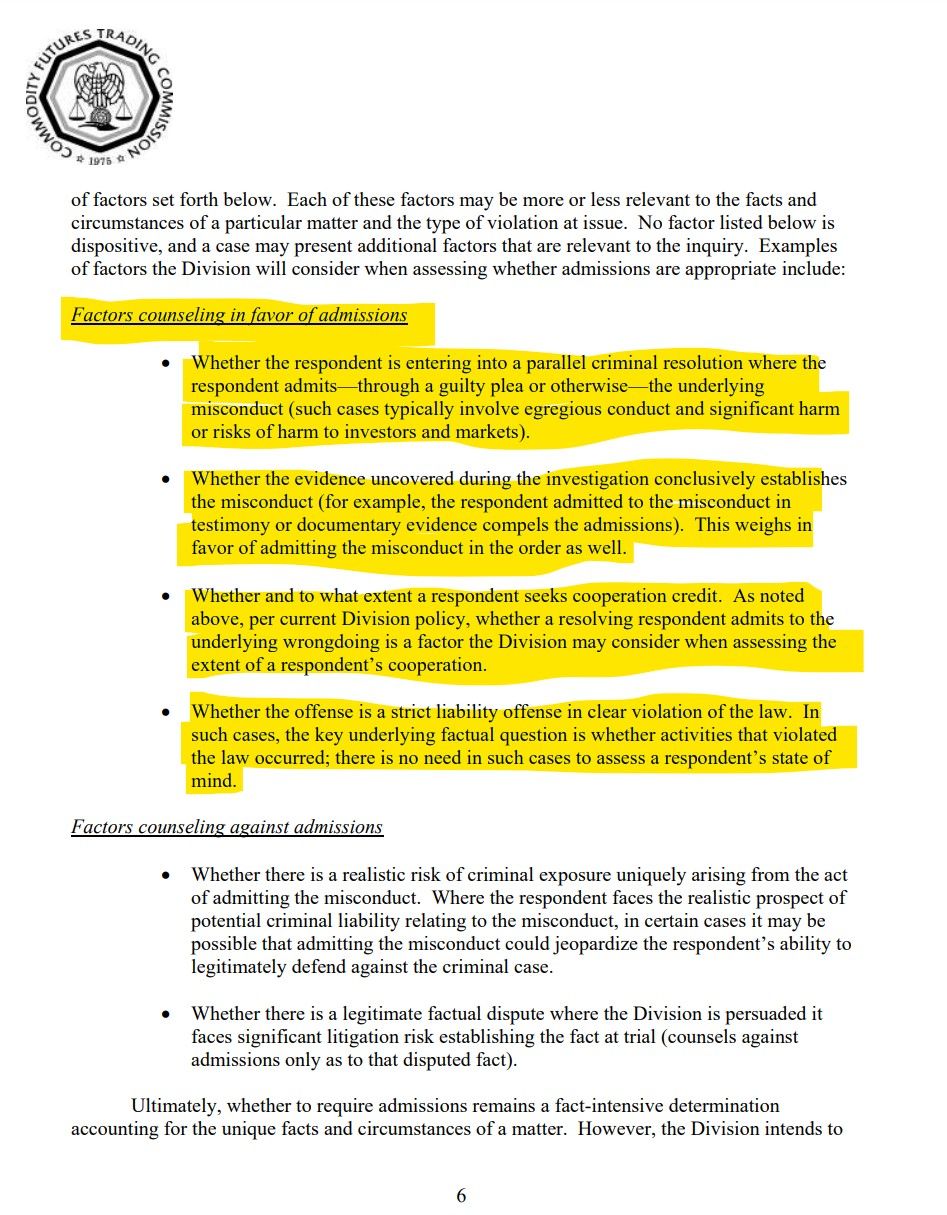
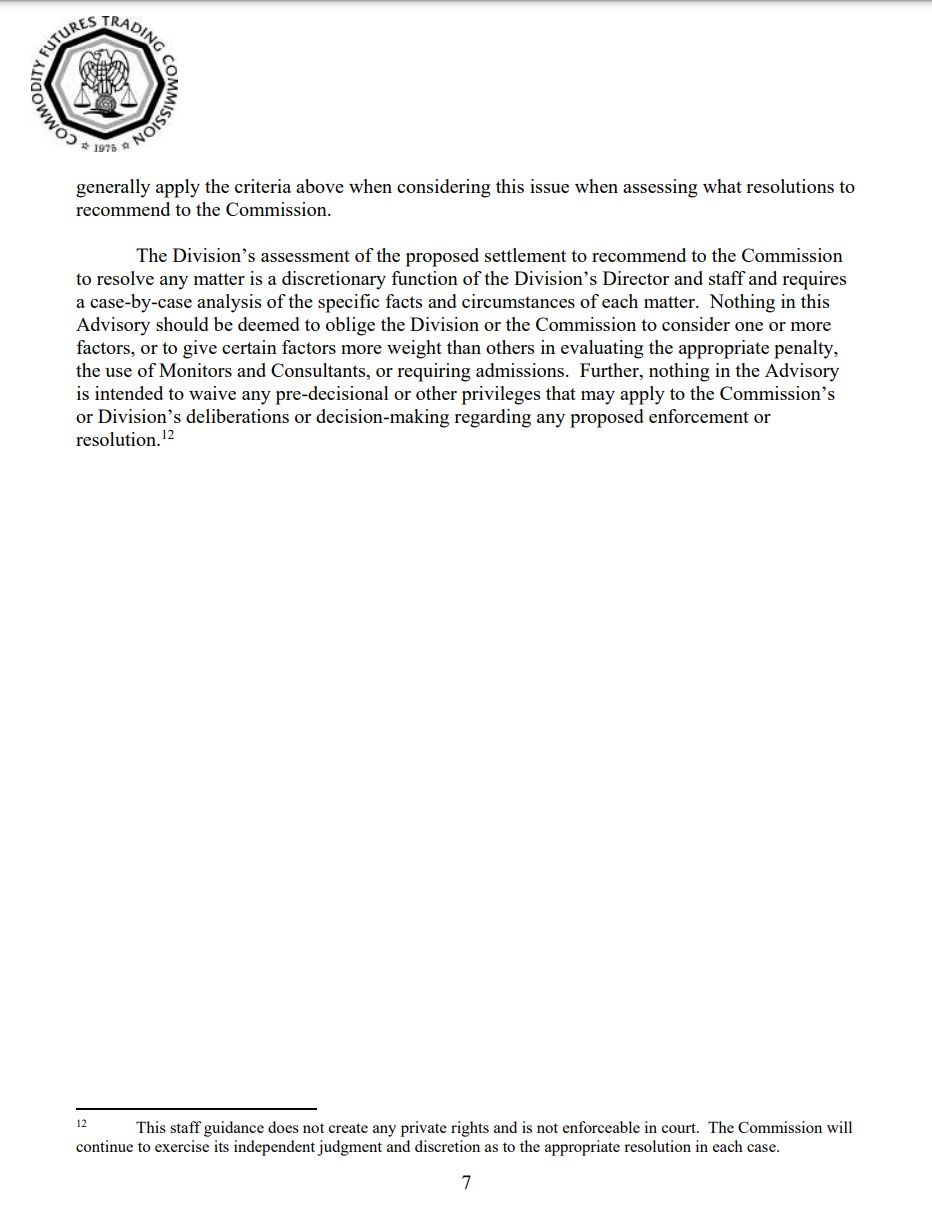
Wut Mean?
The enforcement advisory offers guidance to the Division of Enforcement staff.
The guidance is about:
- Determining if the suggested civil monetary penalty is adequate for both general and specific deterrence, especially concerning repeat offenders.
- Deciding on the necessity of a corporate compliance monitor or consultant and defining their roles and responsibilities.
- Assessing when admissions are suitable based on the specific facts of the enforcement action.
Penalties: Achieving Deterrence
- The Division considers many factors when recommending Civil Monetary Penalties (CMPs) to the Commission, emphasizing deterrence.
- Low penalties might encourage entities to see penalties as just a business expense, thus not deterring unlawful actions.
- Strong penalties encourage compliance and cooperation with the Division.
- The Division is re-evaluating its penalty assessment methods, which might lead to recommending higher penalties than in past similar cases.
- Penalties need to deter repetitive similar violations observed across entities.
Recidivism (Repeat Offenses):
- Cases with recidivism are where a person repeatedly breaks the law. It's especially relevant when the same person has faced previous Commission actions.
- Factors to determine recidivism include:
- Similarity between prior and current actions.
- Time between offenses; recent misconduct is weighed more.
- Overlapping management involved.
- The extent of new misconduct and its duration.
- Effectiveness of actions taken after prior misconduct.
- Recidivism can increase the CMP amount and affects cooperation credits.
- The Division has noted recurring violations by various offenders, including large institutions with multiple significant violations in a short time.
- The Division will emphasize recidivism when deciding penalties.
Actions Against Recidivist Entities:
- The Division will likely recommend Monitors or Consultants as part of the resolution for recidivist entities.
Monitors and Consultants
- The Division uses Monitors and Consultants to ensure that a respondent effectively remedies its misconduct.
- The Division will keep recommending Monitors and Consultants when suitable.
Roles and Responsibilities:
Monitors:
- Must be approved by the Division.
- Duties include:
- Assessing the entity's measures to identify and prevent future misconduct.
- Making specific recommendations based on their assessment.
- Evaluating the entity's updates to its policies based on the Monitor's suggestions and their long-term effectiveness.
- The Monitor will send reports to the Division on the remediation plan and its implementation. If the entity doesn't accept a Monitor's recommendation, they must report the reason to the Division.
- The Monitor and the entity's key personnel, like the Chief Compliance Officer, have to certify the completion of the remediation plan.
Consultants:
- Typically don't need Division's approval.
- Their role is to advise the entity on how to implement remedial measures.
- The entity should update the Division on the remediation process. In the end, key personnel from the entity need to certify the completion of the remedial actions.
Criteria for Recommendation:
- Monitors: Recommended for cases with significant compliance failures, especially when the Division doubts the entity's ability to rectify its misconduct without third-party oversight.
- Consultants: Recommended for less severe cases where the entity might need advisory help for remediation but can act without extensive oversight.
Admissions
- A respondent's admission to wrongdoing can influence how the Division views their cooperation.
- Some recent resolutions include admissions, indicating the Division’s belief that they can be critical components in suitable cases.
Benefits of admissions:
- Encourages accountability and justice.
- Acts as a deterrent.
- Enables better post-resolution cooperation.
Division’s Approach:
- Respondents should no longer assume that no-admit, no-deny resolutions are the default
- In negotiations, the Division will discuss with respondents the relevance of admissions on a case-by-case basis.
The Division will assess several factors when determining the need for admissions, noting that no single factor is decisive:
Factors Favoring Admissions:
- A respondent is also entering into a criminal resolution where they admit the misconduct.
- Clear evidence from the investigation confirms the misconduct.
- A respondent's desire for cooperation credit.
- Offenses where the main factual question is the occurrence of the violation without the need to consider the respondent’s intent.
Factors Against Admissions:
- Potential criminal implications stemming solely from admitting the misconduct.
- A genuine factual disagreement where the Division believes there's a significant risk of not proving the fact during litigation.
Final Consideration:
- The decision on requiring admissions is based on the individual facts and circumstances of each case.
- While the Division uses the aforementioned criteria to guide its considerations, the final assessment for settlements is discretionary and depends on the specifics of each matter.
- This guidance doesn't bind the Division or the Commission to consider any factors or prioritize them in any particular way, nor does it waive any privileges regarding enforcement decisions.
Press Release:
The Commodity Futures Trading Commission’s Division of Enforcement today issued an advisory designed to give enforcement staff guidance on future enforcement resolution recommendations to the Commission. In particular, the advisory provides guidance on determining whether proposed civil monetary penalties are sufficient; when the imposition of a corporate compliance monitor or consultant is appropriate; what the duties and responsibilities of monitors and consultants should be; and whether admissions should be recommended in a particular enforcement action.
“Today, the Division of Enforcement announced steps showing how it will approach key terms of resolutions—civil monetary penalties, monitors, and admissions—to ensure greater transparency and answerability throughout the process,” said CFTC Chairman Rostin Behnam. “As our guiding statute sets forth goals of preserving market integrity and protecting the public, it is our duty to ensure that every enforcement action aims to elevate compliance and optimize deterrence.”
“Accountability and minimizing future misconduct are important Commission and Division objectives. We cannot keep seeing the same entities before us with the same problems.,” said Enforcement Director Ian McGinley. “This advisory provides staff the guidance to achieve these objectives and enables the public to understand how the Division will operate.”
Specifically, the advisory gives staff guidance on the following topics:
Deterring Misconduct Through Appropriate Penalties: The Division is recalibrating how it is assessing proposed CMPs to ensure the CMPs are at the level necessary to achieve general and specific deterrence, which may result in the Division recommending higher penalties in resolutions than may have been imposed in similar cases previously. The advisory also notes the Division will factor recidivism in determining appropriate penalties to recommend to the Commission and details several of the factors the Division will consider in determining whether a person or entity is a recidivist.
Monitors and Consultants – Ensuring Remediation to Reduce Likelihood of Future Misconduct: The Division notes that in cases where it lacks confidence that an entity will remediate misconduct on its own, it will require the resolving entity to engage a third-party approved by the Division to assist in remediation. This will include Monitors—third parties engaged to make recommendations, test those recommendation, and report on the results of their work to the Division—and Consultants, third parties to advise the entities regarding compliance enhancements. Going forward, the Division anticipates recommending to the Commission that a Monitor be imposed in cases involving the most significant and/or pervasive compliance and control failures reflecting a lack of sufficient commitment to effective compliance, and a Consultant will be recommended in serious but less severe cases.
Admissions – Achieving Accountability and Deterrence: Companies and individuals under investigation should no longer assume no-admit, no-deny resolutions are the default. Rather, in each case, the Division will discuss with respondents or defendants whether admissions are appropriate. The advisory describes various factors relevant to the determination of whether admissions are appropriate.
The advisory supplements previous advisories and guidance the Division issued. The advisory announced today reflects the Division’s focus on achieving accountability and minimizing future misconduct when negotiating a proposed resolution that it may recommend to the Commission.

TLDRS:
- CFTC Releases Enforcement Advisory on Penalties, Monitors and Admissions
- "If penalties are not sufficiently high, entities may choose to continue to behave unlawfully, viewing penalties as a cost of doing business."
- "Higher penalties may, in particular, empower compliance professionals at entities to make the business case to senior management for the resources they need to do their jobs effectively. Further, without sufficient penalties, entities may be less inclined to cooperate with the Division, believing that any penalty ultimately imposed will be acceptable and bearable."
- "Going forward, the Division is recalibrating how it is assessing proposed CMPs to ensure that the CMPs are at the level necessary to achieve general and specific deterrence, which may result in the Division recommending higher penalties in resolutions than may have been imposed in similar cases previously."
- "These considerations are especially salient in cases involving recidivism—i.e., repeated violations of law by the same person, for example where the proposed respondent has been the subject of previous Commission actions."
- "In negotiations, respondents should no longer assume that no-admit, no-deny resolutions are the default."



